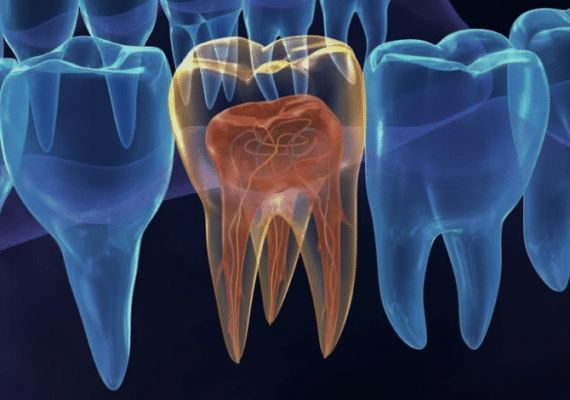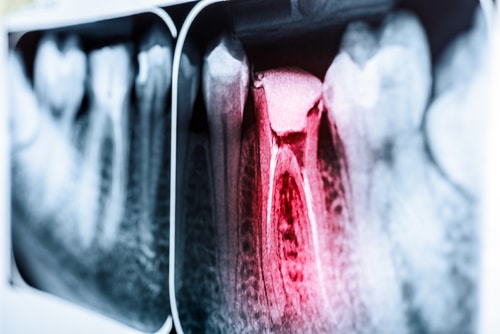Root Canals in Austin, TX
Every day in the United States, dentists perform more than 41,000 root canals. Root canals are an endodontic procedure that addresses the area inside the tooth called the pulp. When the pulp is infected, it must be removed to preserve the tooth’s structure and prevent further damage.
At Aspire Dental, we realize patients often worry about needing root canal treatment. However, advancements in dental technology and sedation dentistry mean that root canals today are not particularly painful. If you or someone you love is experiencing tooth pain, visit the compassionate team at Aspire Dental for diagnosis and treatment.
What Are Root Canals?
In the context of tooth anatomy, a root canal refers to the natural hollow space inside a tooth’s root. Each tooth typically has one or more root canals containing the dental pulp, which consists of nerves, blood vessels, and connective tissue. These root canals extend from the tip of the tooth’s root into the inner chamber of the tooth, known as the pulp chamber.

When people refer to a root canal procedure, they are typically talking about a treatment that involves removing the infected or damaged dental pulp from these canals to alleviate pain and save a tooth from extraction. After we remove the infected pulp, we clean, disinfect, and seal the root canals to prevent further infection. This treatment helps to restore your oral health and stops the infection from spreading to other areas of your body.
When Is Root Canal Treatment Needed?
The tooth’s pulp becomes infected as bacteria from the tooth’s surface progress deeper into its structure. This progression usually results from deep cavities, cracked teeth, or dental injuries. While pain is one of the most common indicators that a root canal is needed, other symptoms may signal infected tooth pulp:
- Persistent, radiating pain that can extend to your face, jaw, or other teeth
- Discomfort while eating or touching the tooth
- Sensitivity to temperature changes
- Tooth discoloration
- Gum swelling
- Pus-filled abscesses near the tooth
- Feeling that the tooth is loose due to bone softening
We also recommend root canals in cases where a tooth is cracked to prevent bacteria from entering the pulp.
Maintaining regular dental checkups is essential, as not everyone experiences these symptoms. Dental visits and X-rays help us monitor your oral health and determine the most suitable treatment options if issues arise.
The Procedure for Root Canals
Typically, root canal therapy involves 1-2 appointments. Dr. Hall and Dr. McNeil employ cutting-edge imaging to assess the infection’s severity and develop a precise treatment plan. Depending on the severity and your specific medical needs, antibiotics or anti-inflammatory medications may be prescribed in the days leading up to the procedure.
The procedure begins with a local anesthetic to ensure you’re pain-free. However, we also offer sedation options for patients who experience dental anxiety, including oral conscious sedation, nitrous oxide (laughing gas), and IV sedation. Our goal is to help you relax while we restore your oral health.
Once you’re comfortable, we will make a small opening in the tooth’s crown to access and remove the infected pulp. We use specialized instruments to remove the pulp from the canals and the main chamber. Then, we meticulously clean and shape the canals before filling the space with a biocompatible material called gutta-percha. Finally, we seal the tooth with a dental filling.
Root canal treatment usually lasts between 30 minutes to an hour. To strengthen the tooth, Dr. Hall or Dr. McNeil may recommend placing a custom-made dental crown. This may require a second appointment, during which the crown is securely bonded to your treated tooth.
Replacing Lost Teeth
If your infection is severe, we may need to remove the tooth to maintain your oral and overall health. To replace a missing tooth, we can use a dental bridge or a mini dental implant and an artificial crown.
A traditional dental bridge is a row of teeth with a crown on each end. Between the crowns is an artificial tooth that covers the space left by the extracted tooth. To place a bridge, we need to remove enamel from healthy teeth on each side of the gap so that the crowns can fit securely. This means that the teeth neighboring the space in your smile must be healthy enough to support the bridge. With meticulous care, a bridge can last for about 15 years.
The Role of Mini Dental Implants
If you want a more permanent replacement with significant oral health benefits, another option is available. At Aspire Dental, we specialize in mini implant technology and placement. A dental implant is a metal post that is affixed to the jaw and supports a restoration like a crown, bridge, or denture. Mini dental implants are smaller versions of conventional dental implants, and although they are much narrower, they offer significant benefits:
- Minimally invasive procedure: Mini dental implants are a less invasive option for tooth replacement, involving a quicker and simpler procedure than traditional implants.
- Faster recovery time: Because the procedure is less intrusive, patients can typically resume their normal activities in as little as 24-48 hours after implantation.
- Less discomfort during and after implant placement: The discomfort associated with mini implant surgery is much milder than with conventional implant procedures, which are more invasive.
- Suitable for patients with limited jawbone density: Mini implants are ideal for patients with limited bone density who may not qualify for large traditional implants.
- Reduced risk of bone loss in the jaw: Dental implants are the only tooth replacement solution that prevents bone loss in the jaw after losing a tooth.
- Lower cost compared to traditional implants: Mini implants are often half the cost of conventional implants, making them a more affordable but equally effective solution.
Additionally, mini dental implants are long-lasting and durable. They can last for many years—even a lifetime with good oral hygiene and routine dental visits.
Replacing missing teeth enhances your chewing and speaking abilities following tooth loss, improves the appearance of your smile to boost your self-confidence, and helps to maintain your oral health. If your tooth is too damaged to be saved with a root canal, there are various replacement methods with high success rates.
Aftercare and Prevention for Root Canals
 After root canals, proper aftercare is essential to ensure the treated tooth heals effectively and to prevent future dental issues. We recommend refraining from eating until the anesthesia has worn off. Beginning with a soft food diet and introducing your normal foods as tolerated will assist in healing.
After root canals, proper aftercare is essential to ensure the treated tooth heals effectively and to prevent future dental issues. We recommend refraining from eating until the anesthesia has worn off. Beginning with a soft food diet and introducing your normal foods as tolerated will assist in healing.
You might experience some sensitivity or mild discomfort in the days following the treatment, which can typically be managed with over-the-counter pain relievers. It’s important to follow post-procedure instructions, which include avoiding hard or chewy foods and practicing good oral hygiene. Maintaining a consistent oral care routine, including brushing, flossing, and regular dental checkups, is crucial to prevent further dental problems.
Preventing the need for root canals begins with a proactive approach to oral health. This involves regular dental checkups, early treatment of cavities and gum disease, and diligent oral hygiene practices. Avoiding excessive sugar consumption and adopting a balanced diet rich in calcium and other essential nutrients can also help maintain strong teeth and gums. Additionally, using protective measures like mouthguards when playing sports and avoiding habits like teeth grinding can reduce the risk of dental injuries and associated infections that might lead to root canal treatment.
Root Canals Restore Your Tooth’s Health
If you’re experiencing persistent dental pain, don’t hesitate to take action and regain your oral health. Dr. Hall and Dr. McNeil at Aspire Dental are dedicated to providing gentle and efficient root canal procedures. With their years of expertise, sedation options, and a commitment to patient well-being, you can trust your treatment will be as painless as possible.
By addressing your dental issues promptly, you not only alleviate discomfort but also prevent further damage, ensuring your smile stays healthy for years to come. Take the first step toward pain relief and long-term oral health by scheduling an appointment with our team.
